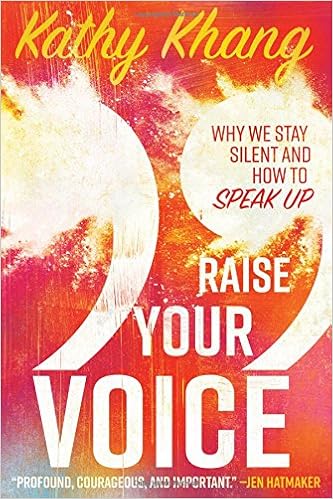
This Week on Seminary Dropout…
Kathy Khang is a speaker, journalist, and activist. She has worked in campus ministry for more than twenty years, with expertise in issues of gender, ethnicity, justice, and leadership development. She is a columnist for Sojourners magazine, a writer for Faith and Leadership, and a coauthor of More Than Serving Tea: Asian American Women on Expectations, Relationships, Leadership and Faith.
You have a voice. And you have God’s permission to use it.
In some communities, certain voices are amplified and elevated while others are erased and suppressed. It can be hard to speak up, especially in the ugliness of social media. Power dynamics keep us silent and marginalized, especially when race, ethnicity, and gender are factors. What can we do about it?
Activist Kathy Khang roots our voice and identity in the image of God. Because God created us in our ethnicity and gender, our voice is uniquely expressed through the totality of who we are. We are created to speak, and we can both speak up for ourselves and speak out on behalf of others. Khang offers insights from faithful heroes who raised their voices for the sake of God’s justice, and she shows how we can do the same today, in person, in social media, in organizations, and in the public square.
Be silent no more. If you have wondered when and how to speak, hear God’s invitation to you to find and steward your authentic voice, whether in word or deed, to communicate the good news in a messed-up world. As you discern God’s voice calling you to speak, you will discover how your voice sounds as you express God’s heart to others. And the world will hear you loud and clear.-From the Publisher



Missio Alliance Comment Policy
The Missio Alliance Writing Collectives exist as a ministry of writing to resource theological practitioners for mission. From our Leading Voices to our regular Writing Team and those invited to publish with us as Community Voices, we are creating a space for thoughtful engagement of critical issues and questions facing the North American Church in God’s mission. This sort of thoughtful engagement is something that we seek to engender not only in our publishing, but in conversations that unfold as a result in the comment section of our articles.
Unfortunately, because of the relational distance introduced by online communication, “thoughtful engagement” and “comment sections” seldom go hand in hand. At the same time, censorship of comments by those who disagree with points made by authors, whose anger or limited perspective taints their words, or who simply feel the need to express their own opinion on a topic without any meaningful engagement with the article or comment in question can mask an important window into the true state of Christian discourse. As such, Missio Alliance sets forth the following suggestions for those who wish to engage in conversation around our writing:
1. Seek to understand the author’s intent.
If you disagree with something the an author said, consider framing your response as, “I hear you as saying _________. Am I understanding you correctly? If so, here’s why I disagree. _____________.
2. Seek to make your own voice heard.
We deeply desire and value the voice and perspective of our readers. However you may react to an article we publish or a fellow commenter, we encourage you to set forth that reaction is the most constructive way possible. Use your voice and perspective to move conversation forward rather than shut it down.
3. Share your story.
One of our favorite tenants is that “an enemy is someone whose story we haven’t heard.” Very often disagreements and rants are the result of people talking past rather than to one another. Everyone’s perspective is intimately bound up with their own stories – their contexts and experiences. We encourage you to couch your comments in whatever aspect of your own story might help others understand where you are coming from.
In view of those suggestions for shaping conversation on our site and in an effort to curate a hospitable space of open conversation, Missio Alliance may delete comments and/or ban users who show no regard for constructive engagement, especially those whose comments are easily construed as trolling, threatening, or abusive.